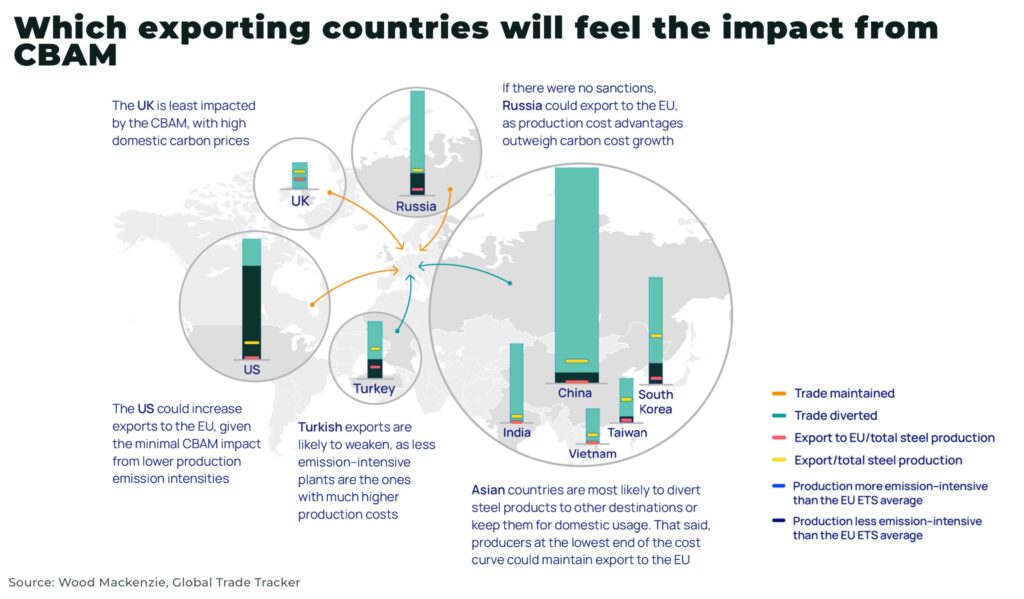UK decided to implement a carbon import levy/tax—Carbon Border Adjustment Mechanism (CBAM)—on some products from 2027. The move aimed at protecting businesses against cheaper imports from countries “with less strict climate policies” may subject $775 million of Indian exports or 6.8% of the exports to the country to 14-24% tax, as per reports quoting experts. Indian exports to the UK were close to a Billion Dollars in 2021-22.
According to reports, the UK will finalise the details, including the precise list of products to be covered, after consultations next week. However, the decision has re-ignited tensions and arguments related to “historic wrongs by developed nations in escalating the climate conditions to its current state”.
“Indian exports to the U.K. of value $775 million may attract CBAM tax in the U.K. starting 2027. The value of specific exports like iron, steel ($565.7 million), aluminium ($101.5 million), ceramics (82.8 million), and glass ($25 million), totalled at $775.3 million for FY23, representing 6.8% of the total exports (to the U.K.) subject to CBAM,” GTRI Co-Founder Ajay Srivastava said.
What does UK’s Carbon Tax mean for Indian exports?
According to a GTRI report in 2023, India’s merchandise exports declined by 5.3%, primarily due to diminishing presence in labour-intensive sectors such as textiles and leather and a weak global trade growth. The CBAM will further pose a significant challenge for India’s metal industry, experts say.

The EU’s carbon tax is expected to affect Indian metal exports including iron and steel, aluminium, fertilizer, and cement, worth over $8 billion annually, starting 2026. Earlier, responding to the EU’s plans, commerce and industry minister Piyush Goyal has already said that India will “retaliate” against such unfair taxes.
“Bharat will address the problem of CBAM with confidence. We will find solutions. We will see how we can convert CBAM to our advantage. Of course we will retaliate. India today does not do these things easily. Even with the US, we retaliated when they had put unfair taxes on us. And see what happened. We were able to resolve all the seven WTO disputes,” Goyal was quoted as saying.
Relationship between UK’s CBAM and India
According to reports, the UK decision will apply to carbon-intensive products in the iron, steel, aluminium, fertiliser, hydrogen, ceramics, glass and cement sectors.
“This levy will make sure carbon intensive products from overseas – like steel and ceramics – face a comparable carbon price to those produced in the UK, so that our decarbonisation efforts translate into reductions in global emissions,” UK Finance Minister Jeremy Hunt was quoted as saying”.
So far as India is concerned, sources say the government considers the tax “unfair” and is considering several measures, including taxing imports from these countries for their “historic wrongs. 
“Broadly the tax will be levied on import of products in manufacturing of which carbon emissions are emitted. However, the move will escalate the price of imported goods, making them less competitive. The fact is you cannot force the market to pay the price without any economic incentive for reducing emissions,” an industry representative said, seeking government policy support.
According to officials, India may be working on different measures like collecting and keeping the tax within the country and using it to decarbonise its own industry.
India may also be considering a tax on imports or goods coming from European countries. India is working on a carbon tax mechanism that aims to penalise imports from developed countries for their historic carbon emission that actually contributed to fuelling global warming at the cost of developing nations, they add.
Why is the world slowly moving towards zero-carbon environment?
Many of the big powers of the world have set a new rule in motion which sees have sanction and fines on companies who emit a lot of carbon in a fiscal year. Although there are certain countries which ignore such rules to invite more business and make their economy strong.
UK was experiencing one such drain out of their company and after a point of time it became necessary to bring laws to prevent the drain and keep the companies in the country.
“The UK CBAM aims to prevent carbon leakage. Carbon leakage is the phenomenon of companies moving production to countries with weaker environmental regulations to avoid paying carbon prices in the UK. Thus, the main aim is to ensure imports are subject to the same rate of carbon tax as the UK producers pay through UK’s Emission Trading System (ETS),” Shrivastav said.












